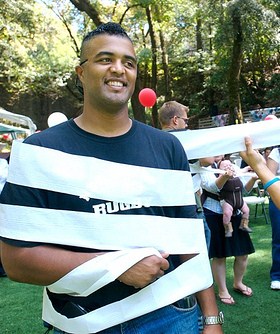
One question I have gotten regularly for years is to clarify the fears inventory for the 4th Step.
While there are many guidelines and varying ideas on how to do several parts of this step I will not go so far as to call anything right or wrong here, but I also have to be clear that I cannot give away something I have do not have. I know how it was done with me a couple of times and how it has been described in the literature and in the circles of historians and AA enthusiasts (if one can be such a thing) in my circles.
Before we get into any details it is important to remember what you are doing when doing the 4th Step.
“We took stock honestly. First, we searched out the flaws in our make-up which caused our failure. Being convinced that self, manifested in various ways, was what had defeated us, we considered its common manifestations.”
I guess I would describe this part of the process as ruthlessly looking for your internal enemy of your life, your recovery and your faith… FEAR!
This short word somehow touches about every aspect of our lives. It was an evil and corroding thread; the fabric of our existence was shot through with it. It set in motion trains of circumstances which brought us misfortune we felt we didn’t deserve. But did not we, ourselves, set the ball rolling?
Dealing with “fear” is an important and key part of every person’s recovery.
Let’s start with the more extreme: Take the more obvious example a person who is an extreme narcissist… behind any level of inferiority complex that makes a person repeatedly tell him/herself to constantly prove him/herself superior to everyone else is a fear that one is inferior. In such a person’s case that fear is the root behind a long list of behaviors and decisions that destroys relationship, destroys happiness, destroys careers and makes enemies of everyone around that person (even if they smile in his or her face).
That narcissistic person will have resentments aimed at each person that stopped dealing with him/her (i.e. left them), for every person at every job that was lost or made uncomfortable and for every person the smiled in his/her face and turned against him/her.
turned against him/her.
But, didn’t that person’s own fears create and exacerbate all of these situations. Didn’t these situations lead this person to the restlessness, irritability and discontent that seemed to justify using? Wasn’t all of this caused by this person shifting to “self-reliance” (pg 68) to find the elusive superiority and to ignore the feelings and needs of the people around him/her?
Almost everything negative in our lives can be tied to some fear or other that is deep within us and probably has been with us so long we probably see it as an old friend that protects us and not as the “evil and corroding thread” (pg 67) that is running through every part of our life trying to poison every aspect of it.
If you look diligently and with ruthless honesty you can find a fear or group of fears in just about every resentment. It may simply be an obvious fear that allowed you to get into that situation, the obvious fear that convinced you to stay in that situation or a complex web of fears that tangled together destroy your thinking, actions, interactions and the lives of everyone around you.

The truth is that awareness of these “FEARS” is a big step in overcoming them. These fears are so effective in negatively affecting our lives because we are erroneously convinced that they are some key ingredient to our success when in fact they are the enemy found in every destructive aspect of our life.
On your fourth step, you go through and look at each incident and first bracket the word “fear” next to every incident where you can see the fear(s) involved and you kept going. Once you have done this to the entire list, you go through and the next column on the list is your fears list. That is where you identify clearly and specifically what each fear is for each instance with ruthless honesty. You need to have an outside look at yourself under a microscope that can se even the tiniest speck of fear in your life.
This fear is one of your “Greatest Enemies” (pg 145). And the irony is that some people struggle with this part of the steps because they have been trained to be afraid of having or admitting any fears and are in effect afraid of the word “fear.”
We reviewed our fears thoroughly. We put them on paper, even though we had no resentment in connection with them. We asked ourselves why we had them. Wasn’t it because self-reliance failed us? Self-reliance was good as far as it went, but it didn’t go far enough. Some of us once had great self-confidence, but it didn’t fully solve the fear problem, or any other.
To set a basic guideline: With very few exceptions, for every item on your list some fear(s) is at the root of that resentment which ended in some act of selfishness on your part. To get rid of the selfish action and not the get rid of theroot fear behind it means the selfish action is destined to return or some new selfishness will surface ending in more resentments and destruction. When you cut off the top of a weed but leave the roots, that weed and other weeds will grow over time (no matter how good your garden may look today).
To sum up: We MUST ruthlessly look for every fear in each item on your list and confront it head on. Then add the fears that are not specifically tied to items already on your list, add those as well and confront those head on also. Additionally, we must be aware of the poison that some of us have for this process that is the “fear” of having or admitting our own fears. Guess what? You have to list that and ruthlessly confront that head on as well.
These new, honest looks at yourself and the roots of your behaviors, issues and self-centeredness will be key your working of the rest of the steps.
While there may be varying ways to work a 4th Step and it’s various parts, the key in this case is not as much the method as it is found in how vigorously, honestly and ruthlessly you search out, admit and confront your own hidden (or not so hidden) fears.
Next we launched out on a course of vigorous action, the first step of which is a personal housecleaning, which many of us had never attempted. Though our decision was a vital and crucial step, it could have little permanent effect unless at once followed by a strenuous effort to face, and to be rid of, the things in ourselves which had been blocking us. Our liquor was but a symptom. So we had to get down to causes and conditions.




